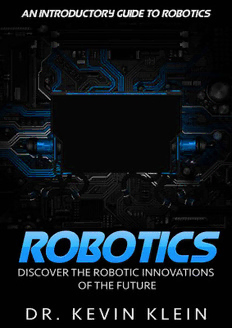
Robotics: Discover The Robotic Innovations Of The Future - An Introductory Guide to Robotics PDF
Preview Robotics: Discover The Robotic Innovations Of The Future - An Introductory Guide to Robotics
Robotics Discover The Robotic Innovations Of The Future An Introductory Guide To Robotics Dr. Kevin Klein Copyright 2015 - All rights reserved. This document is geared towards providing exact and reliable information in regards to the topic and issue covered. The publication is sold with the idea that the publisher is not required to render accounting, officially permitted, or otherwise, qualified services. If advice is necessary, legal or professional, a practiced individual in the profession should be ordered. From a Declaration of Principles which was accepted and approved equally by a Committee of the American Bar Association and a Committee of Publishers and Associations. In no way is it legal to reproduce, duplicate, or transmit any part of this document in either electronic means or in printed format. Recording of this publication is strictly prohibited and any storage of this document is not allowed unless with written permission from the publisher. All rights reserved. The information provided herein is stated to be truthful and consistent, in that any liability, in terms of inattention or otherwise, by any usage or abuse of any policies, processes, or directions contained within is the solitary and utter responsibility of the recipient reader. Under no circumstances will any legal responsibility or blame be held against the publisher for any reparation, damages, or monetary loss due to the information herein, either directly or indirectly. Respective authors own all copyrights not held by the publisher. The information herein is offered for informational purposes solely, and is universal as so. The presentation of the information is without contract or any type of guarantee assurance. Table of Contents Introduction What Is Robotics? Mechatronic Devices “True” Robots History of Robotics The Term “Robot” Early History Isaac Asimov’s Three Laws of Robotics Unimate, the First Robot The Uses of Robotics (Applications) General Purpose Autonomous Robots Dedicated Robots Commercial Robot Uses The Benefits of Robots Careers in Robotics Operator Robotics Technician Robotics Engineer Related Jobs Key Components Three Key Aspects of a Robot Form Electrical Components Computer Code Further Components Sensors Actuators Power Sources Manipulators Locomotion Wheels Tracks Spheres Walking Climbers Snakes Flyers Sailors Swimmers Skaters Research in Robotics Varying Tasks Making Choices Seeing Touch Language Future of Robotics What Might Become? Ethical Dilemmas Ethical Robots Roboethics Stealing Jobs? Computer Code Robot Programming Languages Robot Software Programming Errors Conclusion Helpful Links Introduction To put it in simple terms, robotics is the study or science involved with designing, building, theorizing about, or using robots. While there are many different fields that are involved in the end result of actually working with robots, those will not be discussed here. The more direct subjects that relate to robotics are the focus of this book. A robot is a simple enough idea. It is a machine that can do something by itself, in the simplest terms. You have almost certainly seen them in movies, or read about them. Many people think of a metallic, human looking, machine when they think of a robot. The reality these days is a little less dramatic than that. In appearance, modern robots are often complex limbs or moving tools. They can complete tasks largely without the need for human assistance, but they are a long way from the types of robots people have been imagining for centuries; that’s right—the idea of the robot is very old indeed. The things that robots might be able to do, are a key driving force beyond their development. These ideas drive related fields, and those in turn drive people to come up with better ways to make and use robots. This cycle has been going on for some time, and it goes back a lot more than just a few decades (but you can learn more about that in the History of Robotics chapter). Many people believe that robotics is currently the highest point of technological development. Once society has highly functional and mobile robots at their command, what could happen in the future?
